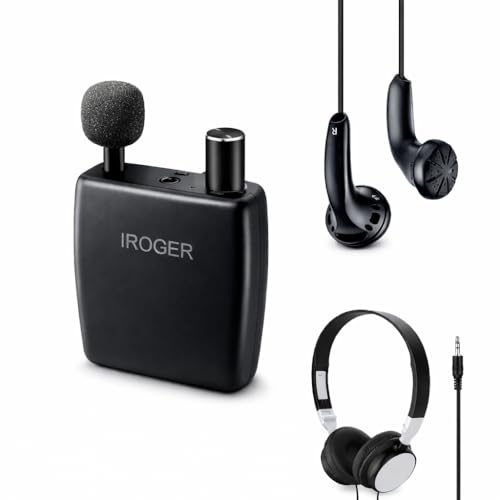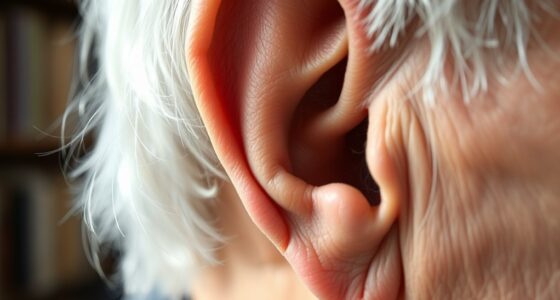Let’s delve into the intricate connection between high blood pressure and hearing loss, similar to solving a intricate puzzle where every piece is crucial.
As we explore the interplay between hypertension and auditory health, we'll uncover the hidden mechanisms that link these seemingly unrelated conditions.
Stay tuned to discover the surprising ways in which high blood pressure can influence our ability to perceive sound and the strategies we can employ to safeguard our hearing against the silent threat of hypertension.
Key Takeaways
- Hypertension damages ear blood vessels, leading to hearing loss risks.
- High blood pressure affects inner ear blood flow, impacting auditory health.
- Managing hypertension is crucial to prevent permanent hearing damage.
- Regular screening and lifestyle changes can safeguard against hypertension-related hearing issues.

Audien Hearing ATOM PRO 2 Wireless Rechargeable OTC Hearing Aids, Premium Comfort Design and Nearly Invisible
Hear What Matters, Forget the Rest: Tired of asking, “What?” in conversations? The Atom Pro 2 is here...
As an affiliate, we earn on qualifying purchases.
Understanding the Link Between Hypertension and Hearing Loss
Exploring the intricate relationship between hypertension and hearing loss reveals a compelling connection that underscores the importance of proactive health monitoring. Hypertension, commonly known as high blood pressure, poses a significant risk to auditory health. The association between elevated blood pressure and hearing impairment stems from the delicate nature of the auditory system. The cochlea, a vital organ in the inner ear responsible for translating sound vibrations into nerve signals, relies on robust vascular health to function optimally. When hypertension damages the blood vessels supplying the cochlea, it can lead to temporary or permanent hearing loss.
Moreover, individuals with hypertension face an increased risk of stroke, further emphasizing the impact of this condition on both hearing and overall well-being. Communication barriers resulting from hearing loss can exacerbate feelings of isolation, stress, and depression, highlighting the critical intersection between auditory health and mental well-being. Therefore, regular screening for hypertension-related hearing issues is crucial to prevent further complications and enhance quality of life.

Joanbro Personal Sound Amplifier for Seniors, Voice Enhancement Devices, Pocket Sound Amplifiers for Elderly People, Adults, 50dB Gain, with Headphones & Earbud, 3 Types Mics, 3 Tone, Volume Control
SUPERIOR PERSONAL SOUND AMPLIFIER: Applying noise cancelling, automatic gain control and advanced amplifying circuit, this sound amplifier device...
As an affiliate, we earn on qualifying purchases.
Impact of Hypertension on Auditory Health

Hypertension exerts a profound impact on auditory health, potentially leading to both temporary and permanent hearing impairment through its damaging effects on blood vessels and nerves in the ears. Here are four key points to consider:
- Temporary Hearing Loss: Individuals with high blood pressure may experience temporary hearing loss due to the compromised blood flow to the auditory system.
- Permanent Hearing Impairment: Prolonged hypertension can result in permanent damage to the blood vessels and nerves in the ears, leading to irreversible hearing loss.
- Degeneration of Auditory System: Hypertension can accelerate the degeneration of the auditory system, affecting the intricate structures within the inner ear responsible for processing sound.
- Overwhelming Impact: The high-speed blood flow associated with hypertension can overwhelm the delicate organs in the ear, potentially causing long-term hearing issues and underlining the significant impact of hypertension on auditory health.
Understanding how hypertension affects auditory health is crucial in recognizing the importance of managing blood pressure for preserving overall hearing function.

IROGER Hearing Amplifier for Seniors, Personal Sound Amplifier, Smart Auto-Gain, Directional Microphone, Rechargeable with 120-Hour Battery, Headphones & Earbuds Included
Smart Auto-Gain Control – Enjoy crystal-clear sound at all times. iRoger automatically balances audio levels to enhance voices...
As an affiliate, we earn on qualifying purchases.
Connection Between High Blood Pressure and Hearing Loss
Hypertension's detrimental impact on auditory health extends to damaging blood vessels in the ears, potentially resulting in hearing loss. The connection between high blood pressure and hearing loss lies in the intricate network of blood vessels that supply the auditory system. When blood pressure is elevated, these vessels can suffer damage, leading to reduced blood flow to the delicate structures of the inner ear. This lack of adequate blood flow deprives the inner ear of essential nutrients and oxygen, causing degeneration and impairing its ability to transmit sound signals to the brain effectively. Research indicates a clear link between hypertension and accelerated auditory system degeneration, highlighting the importance of managing blood pressure to preserve hearing health. In severe cases, the damage caused by high blood pressure to the blood vessels in the ears can result in permanent hearing loss.
| Blood Pressure | Hearing Loss |
|---|---|
| Damaged vessels | Inner ear impact |
| Degeneration | Blood flow issues |
| Permanent damage | Accelerated impairment |

CUEME Hearing Aids - OTC Rechargeable Hearing Aids for Seniors, Clear Sound, Up to 48 Hours of Battery Life, 3 Sizes of Earbuds, Portable Charging Case Included, Automatic On/Off
【New Generation Noise Reduction Chip】The new generation chip can effectively filter out 90% of background noise, while accurately...
As an affiliate, we earn on qualifying purchases.
Preventing Hearing Loss Caused by Hypertension

To prevent hearing loss associated with hypertension, active management of high blood pressure through regular monitoring and healthy lifestyle choices is crucial. Here are four key strategies to help minimize the risk of hearing impairment related to elevated blood pressure:
- Regular Blood Pressure Checks: Consistent monitoring of blood pressure levels can aid in early detection and prompt intervention to prevent potential damage to the auditory system.
- Healthy Lifestyle Habits: Adopting a balanced diet low in sodium, engaging in regular physical activity, and managing stress effectively can help control hypertension and reduce the risk of associated hearing issues.
- Timely Medical Intervention: Seeking medical advice and following prescribed treatment plans for high blood pressure can prevent severe complications, including stroke within two years, which may also impact hearing health.
- Understanding the Link: Recognizing the connection between untreated hearing loss and hypertension can serve as a motivator to prioritize blood pressure management, ultimately safeguarding against impaired hearing and the detrimental effects of hypertension on overall health.
Hearing Health Strategies for Hypertensive Individuals
Audiologists play a pivotal role in monitoring and addressing hearing changes in individuals with high blood pressure. Regular hearing tests are crucial for detecting any alterations in hearing range and severity due to hypertension. These tests help in early identification and management of hypertension-related hearing loss.
Audiologists can provide tailored solutions, including the proper selection of hearing aids, to effectively address hearing issues associated with high blood pressure. Seeking assistance from audiologists is essential in combating the adverse effects of hypertension on hearing health, as they can offer specialized care and support.
Rocky Mountain Hearing & Health Center is one of the facilities that offer comprehensive services such as hearing tests and customized hearing aid solutions for individuals experiencing hearing problems related to hypertension. By working closely with audiologists, individuals with hypertension can better manage their hearing health and reduce the risk of complications such as cardiovascular disease, stroke, and damage to the cochlea and stria vascularis.
Frequently Asked Questions
Can High Blood Pressure Cause Loss of Hearing?
Yes, high blood pressure can cause loss of hearing. The damage it inflicts on blood vessels and nerves in the ears can lead to hearing impairment. The high-speed blood flow from hypertension can overwhelm delicate ear structures, resulting in temporary or permanent hearing issues.
Additionally, research shows a strong link between elevated blood pressure levels and the development of hearing problems. It's crucial to monitor blood pressure for potential impacts on hearing health.
How Long Can You Have High Blood Pressure Before It Causes Damage?
We can have high blood pressure for several years before it starts causing damage, but the duration varies for each individual. Prolonged hypertension can harm blood vessels and nerves, impacting hearing.
Monitoring and controlling high blood pressure are essential to prevent long-term damage. The longer high blood pressure goes unchecked, the more severe the potential damage to hearing.
Regular check-ups and lifestyle adjustments can help mitigate the risks of hypertension-related hearing loss.
Can High Blood Pressure Cause Blocked Ears?
Yes, high blood pressure can cause blocked ears. When hypertension damages blood vessels and nerves in the ears, it can lead to reduced blood circulation in the inner ear, which affects hearing.
This blockage may result in temporary or permanent hearing impairment, contributing to auditory system degeneration and accelerating hearing loss. Managing high blood pressure is crucial to preventing ear blockage and potential hearing issues.
Can High Blood Pressure Cause You to Hear Things?
Yes, high blood pressure can lead to auditory hallucinations, where individuals hear sounds that aren't present. This phenomenon may occur due to the impact of hypertension on the blood vessels and nerves in the ears, affecting auditory processing.
Monitoring blood pressure and seeking medical advice can help manage these auditory issues connected to high blood pressure. It's crucial to address both the hypertension and associated hearing concerns for comprehensive health management.
Conclusion
In conclusion, let's just say that high blood pressure not only affects your heart, but your ears too!
So, next time you check your blood pressure, remember to also keep an ear out for any signs of hearing loss.
It's a real ear-opener to see how hypertension can sneakily impact your auditory health.
Stay vigilant, stay healthy, and listen up to the importance of monitoring both your blood pressure and hearing for a harmonious well-being.










